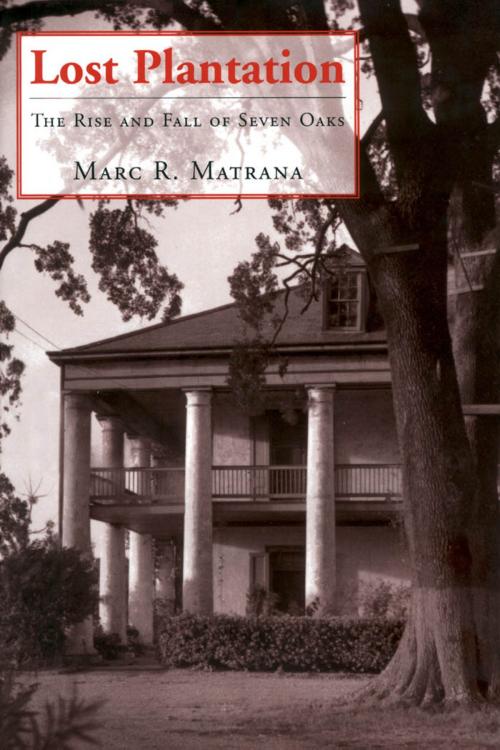| Author: | Marc R. Matrana | ISBN: | 9781604736397 |
| Publisher: | University Press of Mississippi | Publication: | January 25, 2006 |
| Imprint: | University Press of Mississippi | Language: | English |
| Author: | Marc R. Matrana |
| ISBN: | 9781604736397 |
| Publisher: | University Press of Mississippi |
| Publication: | January 25, 2006 |
| Imprint: | University Press of Mississippi |
| Language: | English |
Along the fertile banks of the Mississippi River across from New Orleans, planter Camille Zeringue transformed a mediocre colonial plantation into a thriving gem of antebellum sugar production, complete with a columned mansion known as Seven Oaks. Under the moss-strewn oaks, the privileged master nurtured his own family, but enslaved many others. Excelling at agriculture, business, an ambitious canal enterprise, and local politics, Zeringue ascended to the very pinnacle of southern society. But his empire soon came crashing down. After the ravages of the Civil War and a nasty battle with a railroad company the family eventually lost the great estate. Seven Oaks ultimately ended up in the hands of distant railroad executives whose only desire was to rid themselves of this heap of history. Lost Plantation: The Rise and Fall of Seven Oaks tells both of Zeringue's climb to the top and of his legacy's eventual ruin.
Preservationists and community members abhorred the railroad's indifferent attitude, and the question of the plantation mansion's fate fueled years of fiery, political battles. These hard-fought confrontations ended in 1977 when the exasperated railroad executives sent bulldozers through the decaying house. By analyzing one failed effort, Lost Plantation provides insight into the complex workings of American historical preservation efforts as a whole, while illustrating how southerners deal with their multifaceted past.
The rise and fall of Seven Oaks is much more than just a local tragedy-it is a glaring example of how any community can be robbed of its history. Now, as parishes around New Orleans recognize the great aesthetic and monetary value of restoring plantation homes and attracting tourism, Jefferson Parish mourns a manor lost.
Marc R. Matrana, Westwego, Louisiana, is a local historian and preservationist. See the author's site.
Along the fertile banks of the Mississippi River across from New Orleans, planter Camille Zeringue transformed a mediocre colonial plantation into a thriving gem of antebellum sugar production, complete with a columned mansion known as Seven Oaks. Under the moss-strewn oaks, the privileged master nurtured his own family, but enslaved many others. Excelling at agriculture, business, an ambitious canal enterprise, and local politics, Zeringue ascended to the very pinnacle of southern society. But his empire soon came crashing down. After the ravages of the Civil War and a nasty battle with a railroad company the family eventually lost the great estate. Seven Oaks ultimately ended up in the hands of distant railroad executives whose only desire was to rid themselves of this heap of history. Lost Plantation: The Rise and Fall of Seven Oaks tells both of Zeringue's climb to the top and of his legacy's eventual ruin.
Preservationists and community members abhorred the railroad's indifferent attitude, and the question of the plantation mansion's fate fueled years of fiery, political battles. These hard-fought confrontations ended in 1977 when the exasperated railroad executives sent bulldozers through the decaying house. By analyzing one failed effort, Lost Plantation provides insight into the complex workings of American historical preservation efforts as a whole, while illustrating how southerners deal with their multifaceted past.
The rise and fall of Seven Oaks is much more than just a local tragedy-it is a glaring example of how any community can be robbed of its history. Now, as parishes around New Orleans recognize the great aesthetic and monetary value of restoring plantation homes and attracting tourism, Jefferson Parish mourns a manor lost.
Marc R. Matrana, Westwego, Louisiana, is a local historian and preservationist. See the author's site.















